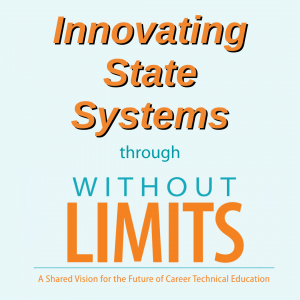The process conducted by state Career Technical Education (CTE) leaders to update their Perkins state plan provides numerous opportunities to reflect on processes, procedures and relationships that keep CTE at the forefront of our educational systems. The Carl D. Perkins Career and Technical Education Act (Perkins V) has been a driving force for connecting systems of education and work across the country. An intentional reflection on systems alignment ensures that CTE remains front and center across state career preparation ecosystems.
 When we discuss systems alignment, we typically think about how a learner moves through secondary education, postsecondary pursuits and then the workforce. There are several strategy areas within Perkins V to consider how your state systems connect and align, including state and local planning processes, program alignment with workforce needs, integration with other federal programs, data-driven decision-making and stakeholder engagement. Each of these strategies offer opportunities to strengthen and streamline your work, and are discussed below with probing questions that may help you think more strategically about alignment in your state.
When we discuss systems alignment, we typically think about how a learner moves through secondary education, postsecondary pursuits and then the workforce. There are several strategy areas within Perkins V to consider how your state systems connect and align, including state and local planning processes, program alignment with workforce needs, integration with other federal programs, data-driven decision-making and stakeholder engagement. Each of these strategies offer opportunities to strengthen and streamline your work, and are discussed below with probing questions that may help you think more strategically about alignment in your state.
State and Local Planning
States are required to develop a comprehensive state plan for CTE. This plan outlines how the state will align and coordinate its CTE programs with other education and workforce development initiatives. During your state planning process, reflect on the following questions:
- How is your state leveraging the CLNA process to encourage alignment and coordination across education and workforce initiatives?
- How is the state using information local entities share through their CLNA to inform state-provided supports?
- How is the design and implementation of local applications supporting state goals and objectives for CTE?
Alignment with Workforce Needs
Perkins V emphasizes the importance of aligning CTE programs with the needs of the labor market. This requires reviewing local and state labor market data and collaboration with employers and industry stakeholders to identify current and future workforce demands. States and local agencies should use labor market information to design programs that lead to high-skill, high-wage, and in-demand occupations. During your state planning process, reflect on the following questions:
- What strategies are you using to engage employers in your state? Are any especially effective?
- How are you leveraging labor market information to inform program design, applications, and approvals?
Integration with Other Programs
Perkins V encourages the intentional coordination between CTE programs and other educational and workforce development initiatives. This includes coordination with programs such as apprenticeships, adult education, and workforce training. This coordination of efforts helps create seamless educational experiences for individuals, ensuring that they are prepared for both postsecondary education and the workforce. During your state planning process, reflect on the following questions:
- Is your state connecting and coordinating with workforce leaders and those administering the Workforce Innovation and Opportunity Act (WIOA) in your state?
- How can state plan strategies integrate with programs and agencies that support special populations as identified by Perkins V and other underrepresented learner populations?
Data-Driven Decision-Making
Systems alignment efforts should be informed by data to guide decision-making. States and local agencies should collect and analyze data related to learner access, persistence, outcomes, program effectiveness, and labor market trends. Data-driven decision-making helps foster continuous improvement and ensures that resources are allocated effectively. During your state planning process, reflect on the following questions:
- How is your state data strategy encouraging or inhibiting cross-agency data sharing and use?
- What are the major challenges around data collection and sharing?
- How are you evaluating your efforts to collect, share, and use data to support high-quality implementation?
Stakeholder Collaboration
Perkins V encourages collaboration among various stakeholders, including educators, employers, workforce development agencies, and community organizations. Engaging stakeholders ensures that the education and training provided through CTE programs is relevant and responsive to the needs of the community. During your state planning process, reflect on the following questions:
- How often is your state engaging stakeholders outside of the state planning process?
- How is stakeholder feedback shared and acted on?
- How are you engaging all stakeholder groups in your planning process?
Additional Support
By focusing on systems alignment, Perkins V aims to create a more cohesive and effective approach to CTE, ultimately preparing individuals for success in the workforce. States and local agencies play a crucial role in implementing and overseeing these alignment efforts. We are here to support you in this work and continue to drive forward that systems alignment is a critical need across the nation.
Advance CTE will continue a suite of supports designed to ensure your Perkins state plan serves as a powerful lever to achieve your state vision for career technical education, and more broadly CTE Without Limits. These supports include:
- Monthly Perkins Planning Office Hours,
- Opportunities for one-on-one discussion on Perkins data and State Determined Performance Levels (SDPLs) for members,
- New mini-briefs on strategies to support special populations in CTE, and more.
 Additional Resources can be found in the Perkins V section of the Learning that Works Resource Center.
Additional Resources can be found in the Perkins V section of the Learning that Works Resource Center.
As we move into the new year, it is the time to reflect on how we work with one another and if those relationships advance learners within the CTE ecosystem. We look forward to continuing conversations with you about the various levers that can be tapped to optimize Perkins V in your state.
Stephanie Perkins, Member Engagement & Professional Learning


 Tell me more about your journey to the Fellowship.
Tell me more about your journey to the Fellowship. Over the past year, three states – Colorado, Nebraska and South Carolina – leveraged
Over the past year, three states – Colorado, Nebraska and South Carolina – leveraged  All of this engagement culminated in a day-long interactive strategic planning workshop in Burlington, Vermont on June 18. Advance CTE’s Deputy Executive Director, Kate Kreamer, and I led and facilitated the workshop, which included not just state CTE staff, but around 30 representatives from a range of stakeholder groups, including local CTE programs, postsecondary institutions, state legislators, industry partners and workforce development. During the workshop, stakeholders examined the data on perceptions of CTE in Vermont and drafted a series of goals and strategies designed to help learners succeed within the state of Vermont. We guided them through a series of exercises to help them understand the needs of learners as well as the needs of other stakeholders and pushed them to work with each other and take ownership over these goals and their role in helping Vermont achieve them.
All of this engagement culminated in a day-long interactive strategic planning workshop in Burlington, Vermont on June 18. Advance CTE’s Deputy Executive Director, Kate Kreamer, and I led and facilitated the workshop, which included not just state CTE staff, but around 30 representatives from a range of stakeholder groups, including local CTE programs, postsecondary institutions, state legislators, industry partners and workforce development. During the workshop, stakeholders examined the data on perceptions of CTE in Vermont and drafted a series of goals and strategies designed to help learners succeed within the state of Vermont. We guided them through a series of exercises to help them understand the needs of learners as well as the needs of other stakeholders and pushed them to work with each other and take ownership over these goals and their role in helping Vermont achieve them.